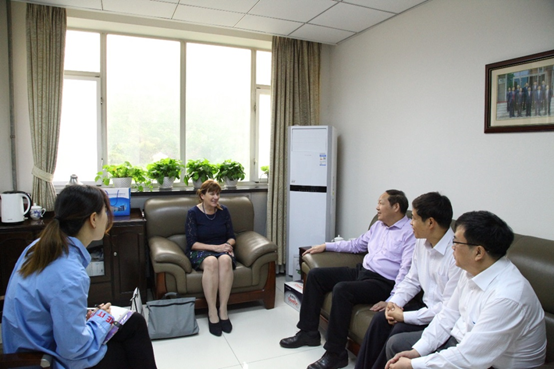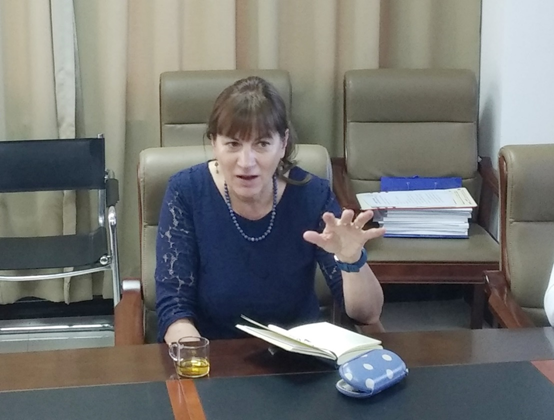Prof. Jennifer Mckinley, President of IAMG Visited ICGG
On May 9-10, 2019, Dr. Jennifer Mckinley, President of the International Association of Mathematical Geology (IAMG), Professor of the Queen's University of Belfast was invited to visit the UNESCO International Centre on Global-Scale Geochemistry (ICGG) for exchanges.
In 2017, the ICGG signed the MOU with the Faculty of Engineering and Physical Sciences of the Queen’s University of Belfast, regarding staff exchanges, scientific cooperation ect.. One geochemist and one doctoral candidate from the China side are currently working and studying at the Faculty as a visiting scholar and a student respectively.
During the visit, Dr. Peng Xuanming, Director of the IGGE, Dr. Hao Guojie, Deputy-Director of the ICGG met with Prof. Mckinley. The two sides reviewed the cooperation progress since the signing of the MOU. Dr. Peng sincerely thanked Prof. Mckinley for her guidance and help to the ICGG staff and hoped to broaden exchanges and enhance cooperation with the aim to promote the study on global-scale geochemistry. Prof. Mckinley spoke highly of the performance of the ICGG staff for their hard work and pleasant cooperation with the local research team. She expressed expects on wider exchanges between the two sides. The Queen’s University of Belfast would also like to send its staff or students to ICGG for joint research in the future.
On the morning of the 10th, Prof. McKinley gave a report on the application of geochemical survey data in the study of nephropathy morbidity in Northern Ireland. The study used Tellus geochemical survey data to study the potential relationship between surface elements, including arsenic, cadmium, and lead) distribution and known nephrotoxins. The study found that several beneficial essential elements had a common protective mechanism, under which elements like selenium and zinc could protect the body from the known nephrotoxin, such as arsenic, cadmium and lead; elements like iron and calcium could increase the body’s absorption of the known nephrotoxin. The composite properties of soil and stream geochemical data were studied to help to analyze the interactions between elements. This research was of great significance in guiding the application of geochemical mapping in ecological environment.
The two sides also had a deep discussion on future cooperation projects. Dr. Wang Xueqiu of the ICGG gave a detailed introduction on the research topic “Comparative Study of Sino-British Geochemical Mapping Data” and the cooperation intention on the “Comprehensive Research on Geochemical Resources and Environment in the Tethys Metallogenic Belt”. Dr. Peng Min from the Department of Geochemical Exploration Method of the IGGE introduced the progress of China Multi-Purpose Geochemical Survey. On behalf of the IAMG, Prof. McKinley showed her willingness to strengthen cooperation between the two parties to fully use the advantages of IAMG in geochemical data processing and to further explore the application potentials of ICGG’s high-quality multi-scale geochemical data. MS. Gao Yanfang, Senior Engineer of the ICGG, introduced the functions of the “Integrated Geochemical Data Processing Software”. Prof. McKinley suggested that the software should include the recent popular functions of the compositional geochemical data processing methods and further expand its application range.
This was Prof. McKinley’s third visit, on behalf of the IAMG, to ICGG in the past three years. In the future, the two sides will strive to carry out more pragmatic cooperation in jointly applying for international cooperation projects, promoting the implementation of the International Scientific Cooperation Program "Chemical Earth".

Dr. Peng Xuanming, Dr. Hao Guojie, Director and Deputy-Director of IGGE & ICGG meeting with Prof. Mckinley


